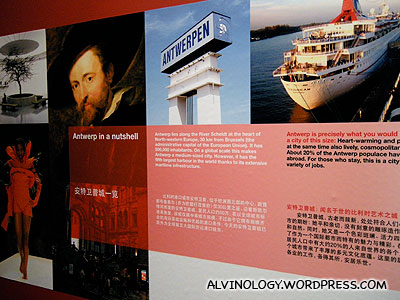
This is an interesting exhibition which I visited some weeks back, together with a bunch of omy.sg invited bloggers.
The Story of the Image is an exhibition initiated by the non-profit organization SingAnt (SingaporeAntwerp) and curated by the Royal Museum of Fine Arts Antwerp (KMSKA) and the Museum of Contemporary Art Antwerp (MuHKA), which have also lent the works of art together with the Museum Plantin-Moretus/Print room Antwerp. The logistic organization was provided by the City of Antwerp, together with the Shanghai Art Museum and the National Museum of Singapore. In short, a multinational ensemble came together to make this exhibition possible. 🙂
The exhibition presents a collection of artworks from the city of Antwerp (Belgium), which is both an historical and contemporary centre for the development of the possibilities of the image. The artworks embody the balancing act between the visible and the invisible.
The exhibition features classical masterpieces by well-known names like Peter Paul Rubens (1577-1640) and Anthony van Dyck (1599-1641), as well as works by top contemporary artists such as Luc Tuymans, David Claerbout, Francis Alys, Marlene Dumas and Berlinde de Bruyckere. An unique mix.
Selected pieces from the Royal Museum of Fine Arts Antwerp (KMSKA):





Selected pieces from the Museum Plantin-Moretus/Print room Antwerp:




Selected pieces from the Museum of Contemporary Art Antwerp (MuHKA):



![Charif Benhelima: Park, 2005 [series Black-out] - a series of fading images on cibachrome that seek to show the transient nature of some images Charif Benhelima: Park, 2005 [series Black-out] - a series of fading images on cibachrome that seek to show the transient nature of some images](http://farm4.static.flickr.com/3471/3910912195_a41d47370b_o.jpg)
















If you are interested to visit this exhibition, more details are available at the National Museum of Singapore website:
VENUE: National Museum of SIngapore, Exhibition Galleries 1 & 2
DATE: FRI 14 AUG 2009 – SUN 31 OCT 2009
TIME: 10:00am – 6:00pm
TICKETING INFORMATION:
S$8 Adult
S$4 Senior (above 60 years old) & NSF
Free for all students with a student pass.
Free admission for children 6 years and under.
Free entry to all galleries for seniors (locals and PR’s), everyday.
Free entry to all galleries for seniors (tourists), every Monday.
Technorati Tags: a story of the image, a story of the image singapore, The National Museum of Singapore, singant, singaporeantwerp, singapore antwerp, royal museum of fine arts antwerp, kmska, musem of contemporary art antwerp, muhka, museum plantin-moretus, print room antwerp, city of antwerp, shanghai art museum, peter paul rubens, anthony van dyck, luc tuymans, david claerbout, francis alys, marlene dumas, berlinde de bruyckere, portrait of a nobleman on a horse, david teniers II, the temptation of saint anthony of egypt, abel grimmer, the four seasons, david rijckaert III, soldiers engaged in plundering a farm and a church, lamentation over the dead christ, joannes I Sadeler, after Judocus Winghe: A house of ill-fame, the thin kitchen, pieter van der heyden, after Pieter I brueghel the elder, abraham verhoeven, the battle at the blokkersdijk near antwerp, indian summer, narcisse todoir, personage, charif benhelima, park, vaast colson, helena’s sculpture, when faith moves mountains, in flanders’ fields, aussie pete




![[Giveaway Alert] KFC Singapore to Kick Off 2026 With 4 New Asian-Inspired Sauces, including Mala and White Curry [Giveaway Alert] KFC Singapore to Kick Off 2026 With 4 New Asian-Inspired Sauces, including Mala and White Curry - Alvinology](https://media.alvinology.com/uploads/2025/12/WhatsApp-Image-2025-12-21-at-2.58.02-PM-2-110x110.jpeg)





![[#Supportlocal] Supplymeetdough takes up Bakers-in-residence at Baker X @ Orchard Central from 2 to 18 Sep, 2022 [#Supportlocal] Supplymeetdough takes up Bakers-in-residence at Baker X @ Orchard Central from 2 to 18 Sep, 2022 - Alvinology](https://media.alvinology.com/uploads/2022/09/cakes-04-1024x576.jpg)

Great coverage of the exhibition and makes me wish I was there. It is interesting to see how extensive the range of artworks are, and how European art has evolved so significantly from the 17th or 16th century all the way to the present age. Somehow those horses remind me of Damien Hirst and his propensity to use animal carcasses as artworks.
hey alvin – didn’t realised you took THAT much pictures! your own story of the images…. btw – if you wanna check some other stuff going on – this sunday it’s hari raya, and all the NHB museums are having open house/free admissions
Hi Riley, thanks for the info. That’s great news, I will go museum visiting this Sunday!
Berlinde De Bruyckere uses animal hide to reproduce an image derived from memory in 3D form. Although it may make you think of Damien Hirst’s use of animals, their intentions are diametrically different. Hirst is about shocking the audience through sensational imagery, while De Bruyckere is really trying to bring to life a distant memory. Its more akin to recreating that memory realistically than to use animals to shock or sensationalise. That’s the fundamental difference in their approach in my opinion. Just my 2-cents worth…………